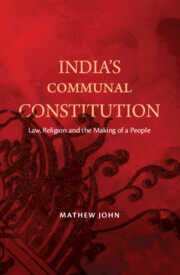Conclusion
Appraising the Communal Constitution
Published online by Cambridge University Press: 05 August 2023
Summary
To sum up and draw this book to a conclusion, the Communal Constitution was introduced as a pathological tendency in Indian constitutional practice that identified the Indian people along religious lines. Normatively, this presents a straightforward problem pointing to the task of defending, justifying, and pulling constitutional practice back to the Indian Constitution's much-celebrated promise of equal liberties. However, to make explicit the contours of the Communal Constitution, this book has consistently bracketed off and distanced its gaze from the search for normatively preferred or correct solutions. In the place of normative argument the previous chapters have emphasised communal aspects in constitutional design and practice that have belied and cohabited with the Constitution's much-celebrated liberal ambitions. Even so, as the Communal Constitution acquires salience against the background of the Constitution's liberal values, those aspirations also set the ground along which the discussion of the previous chapters is best appraised.
The Liberal Background
With the hindsight of the previous chapters, the Communal Constitution could be described as a frustration or even critique of liberal secular aspirations as it has operated in Indian constitutional practice. The hegemonic grasp of liberal secular ideas is under severe stress both in India and in all parts of the modern world. In everyday politics a surge in populist authoritarian and nationalist movements attempts to dismantle the open and fraternal institutional culture that makes equal liberties possible. In the realm of ideas, liberal secular values have always been subject to challenge. However, this has been especially so over the last few decades with a significant body of scholarship pointing to various challenges or impossibilities in engendering and fostering liberal secular politics. This body of work is too large and varied to meaningfully recount, but it is important to mention that its emphasis on a critical reconstruction of liberal secular norms as they have been shaped and passed on by state practice forms an important backdrop to this book's account of the Communal Constitution. Accordingly, exploring the imprint of religion on how the Indian people are identified, all previous chapters have attempted to make salient the challenges posed to the Indian Constitution's bid to demarcate its people as a liberal community of free and equal citizens.
Thus, as the previous chapters have shown, the equal liberty of citizens has not always been the preferred choice to delimit the identity of the Indian people.
- Type
- Chapter
- Information
- India's Communal ConstitutionLaw, Religion, and the Making of a People, pp. 123 - 133Publisher: Cambridge University PressPrint publication year: 2024



